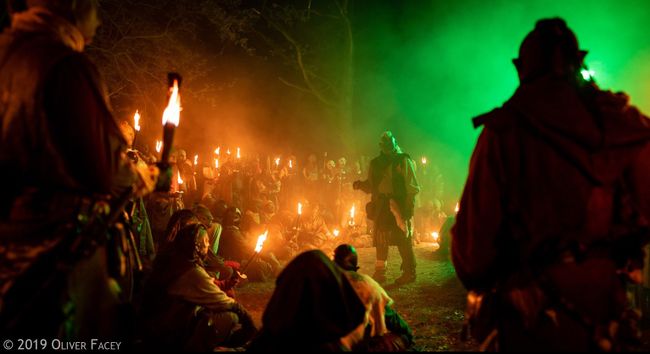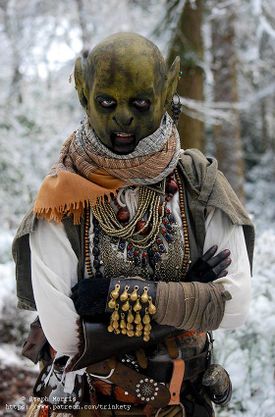Imperial Orcs
(moved Imperial Orcs to Imperial Orc) |
mNo edit summary |
||
| (17 intermediate revisions by 8 users not shown) | |||
| Line 1: | Line 1: | ||
{{CaptionedImage|file=Twelve Breaths.jpg|caption=A spirit woven from loyalty, battle, and the voices of the ancestors.|align=right|width=650}} | |||
<quote>“One life - make it count”</quote> | |||
The Empire was founded as an empire of humanity, but the Imperial Orcs are not human and never will be. Orcs exist in two worlds, guided by the whisper of those who have gone before in their souls, and many are driven by a lust for battle that burns in their blood. While the barbarian orcs embrace these urges, the Imperial Orcs strive to temper their primal instincts. They are few in number and can ill-afford to squander their lives recklessly. | |||
The first Imperial Orcs were slaves just two generations ago. They won their freedom by strength and indomitable will, forcing the Empire to recognise the injustice it perpetrated against them. Reluctantly, the Empire gave them freedom - but nothing more. They were recognized as the tenth nation of the Empire, but they had no land to call their own. In the decades that followed they spent blood and tears fighting the Empire's wars, always pursuing the promise of a home where they might put down roots. Their wandering ended recently when the people of [[Wintermark]] relinquished the territory of [[Skarsind]] in recognition for the nation's great service. | |||
Now the Imperial Orcs face an entirely new challenge - to build a nation worthy of their ancestors, and worthy of their descendants. The first sept of the Imperial Orcs, the descendants of those who fought under Thrace, now call themselves the [[Sunstorm]]. They are joined by five other great septs, the [[Tamazi]], the [[Sannite|Sannites]], the [[Ethengraw]], the [[Illarawm]], and the [[Yerende]]. Each sept is a disparate family of orcs united by one or more common ancestors. The six septs must now find a way to live together: the one thing that unites them all is their loyalty to their nation. | |||
Like the voices of the ancestors, loyalty is part of the orc soul. The barbarian orcs feel a powerful instinctive loyalty towards their nation; they need to feel as if they are part of something larger than themselves. When they lacked a land of their own, the Imperial Orcs strove to make the Empire their nation. Now that they have [[Skarsind|their own land]], some are openly questioning what must come next. Should they strive to make Skarsind the greatest territory in the Empire or seek out new territories to conquer? Their efforts have won them recognition and a place in the great councils of the Empire, but they remain the smallest nation. They will need more before they can stand among the other nations of the Empire as equals. | |||
All Imperial Orcs know they have only one life to live; they strive to burn brightly and leave a better world for their children to inherit. | |||
==Five things to know about the Imperial Orcs== | |||
* '''Loyal to the core.''' Our loyalty to our sept, our nation, and our Empire makes us who we are. | |||
* '''We are citizens.''' We won the right to be part of this Empire and we are proud of our place in it. | |||
* '''We are building a nation.''' We have a homeland now - but a nation is so much more than lines on a map. | |||
* '''War is in our soul.''' Fighting is spiritual and it allows us to hear our ancestors. | |||
* '''Life is precious.''' You have just one chance to make your mark. Do not squander it. | |||
==What the Imperial Orcs are not== | |||
* '''Traditional orcs.''' While the Imperial Orcs draw on some ideas found in other settings, they have their own unique culture and background. They are not the orcs of Lord of the Rings or Games Workshop's Warhammer setting; many elements of those settings do not fit and have been deliberately excluded. | |||
* ''' Brutal or callous savages.''' Imperial Orcs are few in number and if they are to build a nation they cannot afford to lose warriors every time they fight. They enjoy battle, but they strive to minimize losses and they take no particular pleasure in killing. | |||
{{CaptionedImage|file=Skywise Tulva.jpg|align=right|width=275}} | |||
''If you are planning to play an Imperial Orc please read the [[Orc|species brief]] as well as this page'' | |||
{{Imperial Orcs Links}} | |||
__NOTOC__ | |||
Latest revision as of 13:47, 11 April 2024
“One life - make it count”
The Empire was founded as an empire of humanity, but the Imperial Orcs are not human and never will be. Orcs exist in two worlds, guided by the whisper of those who have gone before in their souls, and many are driven by a lust for battle that burns in their blood. While the barbarian orcs embrace these urges, the Imperial Orcs strive to temper their primal instincts. They are few in number and can ill-afford to squander their lives recklessly.
The first Imperial Orcs were slaves just two generations ago. They won their freedom by strength and indomitable will, forcing the Empire to recognise the injustice it perpetrated against them. Reluctantly, the Empire gave them freedom - but nothing more. They were recognized as the tenth nation of the Empire, but they had no land to call their own. In the decades that followed they spent blood and tears fighting the Empire's wars, always pursuing the promise of a home where they might put down roots. Their wandering ended recently when the people of Wintermark relinquished the territory of Skarsind in recognition for the nation's great service.
Now the Imperial Orcs face an entirely new challenge - to build a nation worthy of their ancestors, and worthy of their descendants. The first sept of the Imperial Orcs, the descendants of those who fought under Thrace, now call themselves the Sunstorm. They are joined by five other great septs, the Tamazi, the Sannites, the Ethengraw, the Illarawm, and the Yerende. Each sept is a disparate family of orcs united by one or more common ancestors. The six septs must now find a way to live together: the one thing that unites them all is their loyalty to their nation.
Like the voices of the ancestors, loyalty is part of the orc soul. The barbarian orcs feel a powerful instinctive loyalty towards their nation; they need to feel as if they are part of something larger than themselves. When they lacked a land of their own, the Imperial Orcs strove to make the Empire their nation. Now that they have their own land, some are openly questioning what must come next. Should they strive to make Skarsind the greatest territory in the Empire or seek out new territories to conquer? Their efforts have won them recognition and a place in the great councils of the Empire, but they remain the smallest nation. They will need more before they can stand among the other nations of the Empire as equals.
All Imperial Orcs know they have only one life to live; they strive to burn brightly and leave a better world for their children to inherit.
Five things to know about the Imperial Orcs
- Loyal to the core. Our loyalty to our sept, our nation, and our Empire makes us who we are.
- We are citizens. We won the right to be part of this Empire and we are proud of our place in it.
- We are building a nation. We have a homeland now - but a nation is so much more than lines on a map.
- War is in our soul. Fighting is spiritual and it allows us to hear our ancestors.
- Life is precious. You have just one chance to make your mark. Do not squander it.
What the Imperial Orcs are not
- Traditional orcs. While the Imperial Orcs draw on some ideas found in other settings, they have their own unique culture and background. They are not the orcs of Lord of the Rings or Games Workshop's Warhammer setting; many elements of those settings do not fit and have been deliberately excluded.
- Brutal or callous savages. Imperial Orcs are few in number and if they are to build a nation they cannot afford to lose warriors every time they fight. They enjoy battle, but they strive to minimize losses and they take no particular pleasure in killing.
If you are planning to play an Imperial Orc please read the species brief as well as this page
Further Reading
Core Brief
Additional Information
- History
- Leadership
- Economic interests
- Military concerns
- Religious beliefs
- Magical traditions
- Hearth magic
- Territories
- Children
- Music
- Archetypes
- Groups

